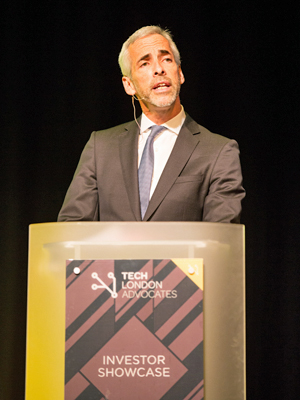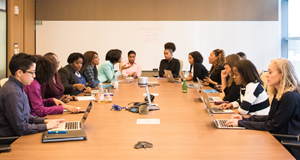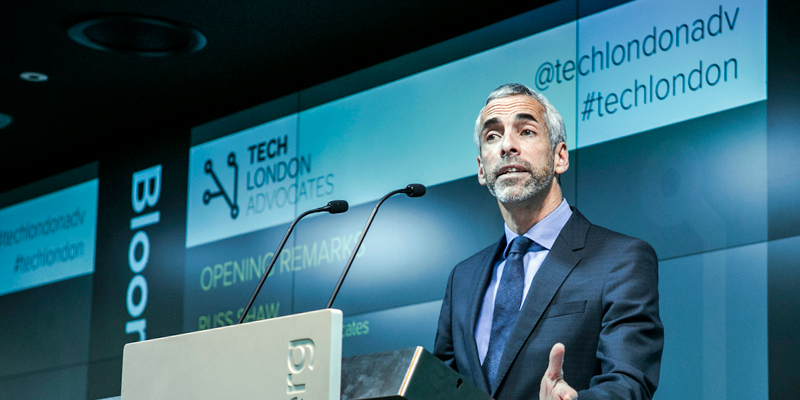Russ Shaw CBE is the founder of Tech London Advocates (TLA) and Global Tech Advocates (GTA), private sector-led groups of leaders promoting tech ecosystems and addressing issues on the horizon. The groups are not-for-profit communities of individuals with aspirations to build and promote tech hubs globally. Russ is also part of the London Tech Week steering group, advisor to the Digital Skills Partnership at DCMS, Teen Tech, Growth Enabler and Creative Industries Federation, as well as being a trustee of Founders4Schools and Modern Muse charities.

“As we look at the pandemic and we look at the disproportionate impact it had on women, on communities of colour and on people with disabilities, how do we make up for that? How do we focus on resources and talent from those sectors of the economy and bring them into work, especially in a sector like tech where we’re desperate for talent from all backgrounds and all walks of life?”
London calling
In terms of my educational background, I was educated in America, I went to high school, in a place called Scottsdale, just outside of Phoenix, Arizona. I went on to Washington University in St. Louis, Missouri.

I then worked for a couple of years before going to Harvard Business School, which is part of the reason why I am here in the UK, because I met a wonderful woman who came over from North London to get her MBA, we sat next to each other on the first day of class and about a little over a year later, we got engaged. She brought me over to the UK in 1992 for a few years and here I am still nearly 30 years later. So, whenever people say: “What brought you to the UK?” I can just say: “It was love!”.
My corporate career started off in financial services at American Express and a company called Charles Schwab. Then I moved into telecoms and a technology company at the time called MTL, now called Virgin Media. I was a CEO of a later stage start-up, a company called MobileWay that got acquired.
I then became the marketing director for O2. We were acquired by Telefonica of Spain, which was another good exit for me, but I stayed on with Telefonica became their global innovation director. I was there for a couple more years and then got recruited to work for Skype to be their vice president and general manager for Europe, Middle East and Africa to set up a mobile division. (When I joined Skype, it was mainly a desktop service, there was no Skype on mobile devices, but I was brought in to help change that.) We were then bought by Microsoft in 2011.
That’s when I decided to leave my full time corporate career and when the idea around Tech London Advocates, and eventually Global Tech Advocates, came to life.
Bringing together an inclusive community of tech leaders
Tech London Advocates was an idea that I had back in 2012. I’d been out of Skype for about a year doing non-executive work and some advisory work. I could see at that time that London’s tech sector was starting to gain some traction that we were starting to see some interesting start-ups emerge. Initially in an area of London called Hoxton, which we now call Tech City or Silicon Roundabout.
I could see that our government at the time under David Cameron and London’s mayor at the time, Boris Johnson, were out there promoting tech. It was great but I felt that we needed to bring together a community of tech leaders that could include everyone, from the founder, entrepreneur, to the investor, to the big corporate, to the university, to the student, to the teacher – you name it, anybody who wanted to take part.
The birth of Tech London Advocates
At Tech London Advocates we do two things. Firstly, we speak, blog and tweet about tech. We try and speak with a consistent voice to the media, to government and to key influencers. We also put the spotlight on the issues and challenges we face as a sector, whether that’s shortage of talent, the complete lack of diversity in the tech sector, or around infrastructure issues and funding.
That’s where the idea for the group came from. I launched it in April of 2013, eight years ago this very month, which is hard to believe. We had about 75 to 80 people show up at a really small venue, in Shoreditch called Central Working, which is right next to Google HQ, and Tech London Advocates was born.
I make it very easy for people to come into the community. I ask them to do three things – firstly to use it as a resource, and secondly to eventually introduce a new advocate to the community (so we grow through network effects), and thirdly to adopt the ethos, which is a spirit of helping each other and supporting each other for the greater good. Everybody in the community is an advocate.
Building something bigger
It’s a group that’s built on wanting to create something bigger and grow something more significant on the back of people volunteering to help do so. We now have 50 working groups in Tech London Advocates.

We’ve tried incredibly hard to bring more women into the technology sector and we’re constantly thinking about how we can help and support women in all aspects of digital and tech.
Creating a global group of tech leaders built on a spirit of volunteerism
On the Global Tech Advocate side, we have about 11,000 advocates, all around the world. A female associate in Copenhagen said to me: “Russ, I want to do what you’re doing in London, but in Copenhagen and across Scandinavia.” So, we sat down and crafted a licencing agreement. I licenced the brand, the IP and the operating principles for a whopping £1 a year. It’s not about making money, but it’s about creating a very similar group of tech leaders built on a spirit of volunteerism. Tech Nordic advocates was born back in 2015.
Fast forward to today, we have 18 groups in the global network. There are four in the UK, London, Tech North advocates, which covers the North of England, a Scotland group and a Belfast group. Then we’ve got groups in the Nordics, Spain, Italy, France and Netherlands. We’ve got four groups in the Americas, including a group in the Bay Area of the US, Canada, Mexico, and Bogota. We have four groups out in Asia, Japan, Singapore, Shanghai, and we’re adding seven more groups this year. Next up is Tech India Advocates, which launches later this month.
Creating interconnections for dynamism and strength
A year and a half ago we did our very first Global Tech Advocate summit. We had nine of the then 16 groups join us for a week in China, so we did a summit in Shanghai and then stayed on to tour science and innovation parks there. We then moved on to Beijing and did the same thing. We had a great week and in China learned so much about their science and tech ecosystem.
We are hoping to do another one, if not this year, early next year with a focus on Tech for Net Zero, really bringing this great community of global tech leaders together, interconnecting our tech hubs and making them all hopefully more dynamic and stronger as we go.
Rapid response to COVID-19
In terms of COVID-19, it’s been a tough year for everyone. We’re all very much looking forward to hopefully coming up out of the latest lockdown in the UK very soon. When we first went into lockdown in March of 2020, we knew we had to move fast, so literally within a week, we put up the Tech London Advocates COVID-19 Resource Hub. We were doing loads of podcasts, Zoom calls, giving help and advice to start-ups and scale-ups – anybody who wanted it.
A very important theme at the time was around cash flow and cash flow management, so we brought in experts in terms of how do you do a better job of managing your cash flow. We also shared what investors were saying to their start-ups and scale-ups to preserve cash to get through the immediacy and difficulties of the crisis.
We then supported the Save Our Start-ups campaign, and the Chancellor eventually launched the Future Fund on the back of that campaign, which is wonderful to see. We still have over 70 advocates giving free help and advice to anybody who wants it, and there’s all the information on the COVID-19 Resource Hub.
Tech-fuelled economic recovery
For some businesses in tech, it was tough, particularly for early-stage businesses, but for many, and especially those who pivoted their business models, it actually has been a boom time. Many companies are far busier than they’ve ever been, obviously everything happening remotely, but a real acceleration of all things digital and all things tech.
Tech Nation came out with a statistic last autumn that said, since lockdown, there was a 36% increase in tech vacancies, which kind of shows the dynamism that’s going on in the sector in areas like health tech, cyber tech, ed tech and AI. So, by and large, it’s been a boon for the technology sector, but again, scraping the surface, there have been some issues and challenges within it.

We now have nearly 3 million people across the UK working in the digital tech economy, which is a 40% increase on two years ago. So, there’s a lot of good things happening here. Even the Prime Minister is saying he’s looking at tech as a key part of the UK’s economic recovery, so let’s get out of this pandemic as quickly as we can and hopefully start to go into greater economic recovery.
A future of innovation and collaboration
When it comes to remote working, companies, in general, are now saying you can work from home mostly, if not all of the time. Last year we did a big thought leadership piece with HP and we then did a webcast with them. We talked with CTOs, CIOs and heads of IT of many businesses around the world, focusing not only on the immediacy of the pandemic but how they were planning for the post-pandemic environment.
We learned so much about so many companies who literally one day had everybody in the office, and the next day had everybody at home. Some of them transitioned incredibly well while others struggled, depending on their infrastructure and their legacy environment, but everybody was forced into this situation.
Coming out of it now, the sentiment is that not everybody’s going to be rushing back to go to the office. Many companies are looking at their office space and figuring out how do they accommodate for people who may not be coming in five days a week, but maybe two or three days a week? Excitingly, how might they adjust and adapt their workspace for more co-working and collaboration? I’ve talked with a couple of companies who want to open up their workspace to start-ups for some kind of corporate innovation and collaboration, which I find really exciting.
Hybrid working is here to stay
From the individual perspective, many people in tech had already started to work from home part time anyway, because people were embracing the technology, but now the whole world knows how to use this technology and hybrid working is here to stay. Every aspect of what we plan, whether it’s work or events, will have a virtual component to it. For many people that will bring benefits. Some people don’t want to work from home though. Living in London you’ve sometimes got four, five or six people sharing flats together, which creates challenges.
Parents often like the fact that they now don’t have to commute an hour each way, so I hope it turns out to be a positive. Where there’s more flexibility around the work/home life balance, companies are going to have to invest in terms of how they rethink their workspace. I do hope it will be a positive legacy of what comes from this pandemic, in terms of the flexibility and adaptability that we all showed in terms of how to work in this environment.
Diversity and inclusion have never been more important
It’s also been an interesting time for diversity and inclusion. Two months after we all went into the first lockdown, we saw what happened with George Floyd and Black Lives Matter, which is now resonating again as we go through the trial. That raised a lot of awareness in terms of people from different backgrounds and the issues that they face, suddenly coming into the discussion.
Women, in particular, were hit hard by the pandemic, especially if they were moms trying to home school and to have a job at the same time. I don’t know how people made it through those tricky periods. I could just hear this collective sigh of relief from the moms and the dads on the eighth of March when schools reopened. I’ve got three grown sons who are all out of the house so I didn’t have to go through all the tough decisions and trade-offs.
As we look at the pandemic and we look at the disproportionate impact it had on women, on communities of colour, on people with disabilities, how do we make up for that? How do we focus on the resources and talent to bring them into the tech sector where we’re desperate for talent from all backgrounds and all walks of life?
Building a more supportive and collaborative future
There’s a lot of positives but there have been some negatives with remote working. I know people in different parts of the world who felt that their bosses could call on them any time of the day or night, so there was clearly a blurring of the boundaries between work and home life, particularly with Zoom where you’re going into everybody’s homes, and that’s challenging. And of course, certain jobs disappeared completely overnight – look at the travel sector, look at the hospitality sector.
Then there’s all of the mental health issues. I just heard the story of a young person in secondary school who, when schools reopened just couldn’t get out of bed because she was just so anxious and depressed about school and what that meant. So, we have to be more accommodating. We have to be more thoughtful, we have to be more supportive of how this has impacted everybody, some for the better, some for the worse and hopefully, learn good lessons from this experience, because who knows when that next pandemic will happen?
How do we take what we’ve spent over a year trying to figure out – things we’ve gotten wrong, but also what we’ve gotten right. That’s what we have to learn from as we come out of this and say: “How do we build that future that is more supportive, more collaborative?” That plays nicely in terms of the work that we’ve done as a community to help and support each other.
Being an ally: This is everybody’s agenda
Being an ally is a personal issue for me. Tech is a sector that is 80% white men and that is not sustainable, and it’s not going to build the best products and services. We are doing ourselves a disservice by not having a more representative workforce in the tech space. There are all kinds of reasons why we are where we are, but I think we have to collectively work hard to address and fix that.
I often say to people: “It’s not just an issue for women, it’s an issue for men too.” Men have to work harder to improve the imbalance that is out there. We know that diverse businesses build better products and services, we know that they’re more profitable – the business case is overwhelming. I’ve just finished reading The Double X Economy by Linda Scott. It’s a really insightful book on the economic impact of having women not participate in the workforce. The technology sector is a clear example of where we’ve let ourselves down.
We have to work side by side, whether it’s mentoring, coaching, making opportunities more accessible for women, and starting with young girls to encourage them to say: “This is not just where men work, but women can also work very successfully in the space.” We desperately need women to come into the sector.

It’s not just women, it’s black women, it’s all people from different backgrounds. We have to work harder to change this. A lot of my conversations are with other men saying: “What are you doing?” “What are you taking on personally?” Even if it’s just finding a woman in your company that you can support, mentor, sit down and talk with about these issues.
What are you doing to change the environment that you’re in? Because a lot of the men I’ve worked with over the years don’t necessarily see this or feel this until they know somebody personally who is affected by that issue or challenge. Maybe they have a daughter that’s also dealing with these particular issues. That’s when it becomes personal.
We have to do more before it gets to that point to say: “This is everybody’s agenda. Let’s work together to fix this.” I’m more optimistic than I was two or three years ago that things are happening. But are we really moving the needle? I’ve yet to see the numbers dramatically change that demonstrates that we’re being successful. Therefore, we need to double down and triple down to make sure we work that much harder.
Talent and transferrable skills
It’s also important to get role models out there. A lot of what we try and do around some of my trustee work with Founders for Schools and Maths4Girls, and Digital Boost is around getting role models into the community. And not necessarily fifty something like me, but getting young women talking to other young women. Getting young black women to talk to younger black women to say: “Look, these are the things that you can do. These are the support networks that are out there, you can have a great future in tech.”
Part of it is also the sense of: “Oh, tech is about coding, programming, data science, cybersecurity and algorithmic tools.” That’s part of it. We need that talent but it’s also about transferable skills.
When I talk with young people, I say: “Look, if you’re interested in writing and an English, fantastic – think about how what you do can work in terms of preparing digital content. If you’re into art and design, wonderful, don’t lose that. Think about a future where you could be a UX or UI designer,” because we desperately need people who have great artistic and design skills, as well as project management. I know a lot of people in more traditional industries who have phenomenal project management skills.
When you look at women in particular, we want them to study STEM subjects, but it’s about transferable skills too. Many of them may have not studied mathematics or science but they can still have a future in digital and tech. We want them to come into the sector as well. So, it goes across the board. We’re all sensitised to it, but now we all need to make it happen.
Advice for people looking for a new career in tech
Last year, we launched the Tech London Advocates Education Resource Hub. In it are all kinds of information about courses, many of them free, a lot of information about digital skills, and a lot of information about apprenticeships. Further Education News called it the most comprehensive online portal for digital skills in the UK, built by volunteers, which makes me proud, because they did such a great job building it.
There are a lot of resources for career changers out there, so my advice to those looking to find out more about tech careers is to go on to the Tech London Advocates Education Resource Hub, there’s courses, seminars, information about how you can make that transition.
I talk to all people of all ages, because it’s not just young people. I talk with a lot of 40, 50 and 60 somethings who are going to have to work for a period of time, and they’re worried their skills are no longer relevant. It’s okay. Lifelong Learning is a vitally important part of our society.
Go on a course, whether it’s project management or some aspect of digital skills. Put your toes in the water, try and get some experience and build on that step by step. There are so many things out there for people to take advantage of. Go into it with an open mind, explore networks. Communities like ours are all about networking and meeting people who can help those out there who are looking to make that transition.
Coming up next

For the remainder of the year after we do that event we’re going to pivot and focus on Tech for Net Zero. As the UK prepares to host the 26th UN Climate Change Conference of the Parties (COP26), I think we feel it’s really important that tech plays a leading role in terms of how we can try and save the planet.
https://www.linkedin.com/in/russ-shaw/
https://www.techlondonadvocates.org.uk/
https://twitter.com/TechLondonAdv
https://www.globaltechadvocates.org/
https://twitter.com/GlobalTechAdv
Harvard Business School image credit: By Dariusz Jemielniak (“Pundit”) – Own work, CC BY-SA 3.0, https://commons.wikimedia.org/w/index.php?curid=53391313





